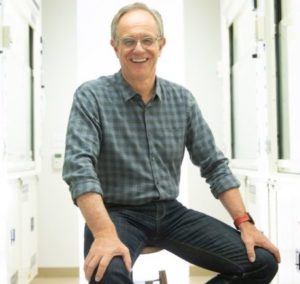by Buck Institute
February 12, 2020 . BLOG
When does “healthy” turn to “healthy aging”?
 By Eric Verdin, President and CEO of the Buck Institute
By Eric Verdin, President and CEO of the Buck Institute
At the Buck we spend a lot of time emphasizing how much of aging we can change. This is absolutely true, both in the lab and within our own lives. In the lab, we can extend a worm’s lifespan by up to 500%. But even out in the real world, there are few people who can’t benefit from a better diet and more exercise, no matter their age. However, it is also true that starting earlier is better than later. In fact, it’s best to start practicing “healthy aging” strategies before we even think of aging as happening. To quote a young Alec Baldwin in Glengarry Glen Ross: “Always be closing”! We should always be taking steps toward healthy and vibrant later years, regardless of our current age.
Indeed, much of what we call “healthy aging strategy” is also just “healthy”. As someone deeply absorbed in the biology of aging and research on aging, it’s quite interesting to reflect on how much health research and advice are all about preventing age-related damage that leads to age-related diseases. Why do we want kids to eat healthy? One reason is so they maintain healthy body weight and insulin sensitivity and don’t develop type 2 diabetes later in life. Why do we tell teenagers not to smoke? Because smoking, of course, accelerates aging pathways associated with cancer and cardiovascular disease. Part of the reason it can be so difficult to ingrain these habits at a young age is because the benefits frequently don’t manifest until decades later.
There is strong data to back up the benefit of getting in the health swing early though. A recent study looked at 30 years of data from 100,000 people in midlife and found that there are 5 habits associated with additional healthy years and reduced time spent with chronic disease: (1) eating a healthy diet, (2) exercising regularly, (3) keeping a healthy body weight, (4) not drinking too much alcohol, and (5) not smoking. At age 50, women engaged in 4 out of 5 of these habits benefited from almost 11 extra years free of diabetes, cancer, and cardiovascular disease. Men engaging in 4 out of 5 habits at age 50 got about an extra 9 years free of these chronic diseases.
More and more evidence is appearing that underscores the importance of exercise. We all know intuitively that moving more and doing strength training helps us feel better. Now another recent study shows a strong relationship between muscle strength and cardiovascular health. Scientists followed more than 1,000 people, tracking their muscles and heart health as they moved through middle age. They found that men who had plenty of muscle in middle age decreased their risk of developing heart disease later in life by about 80 percent.
The return on healthy habits is analogous to compounding interest on investments: early investments in health return outsize benefits later. As in the study above, a 50-year-old engaged in healthy lifestyle choices can expect about 10 extra healthy years. Someone picking up healthy habits later can still expect to see benefits, but they won’t gain a full 10 years.
So at what point do healthy habits turn into healthy aging habits? Maybe it’s when you wake up with a backache that doesn’t get better after a few stretches, or when you realize that a calorie is not always a calorie and that fat tends to accumulate as you age. In the near future, as new scientific advances and new technologies move into the physician’s office, it might be when you test high for certain specific biomarkers of aging. At some point this is a philosophical distinction. We all want to feel as good as possible for as long as possible. The good news is that it’s never too early to start. The other good news is that it’s never too late to start!

SHARE